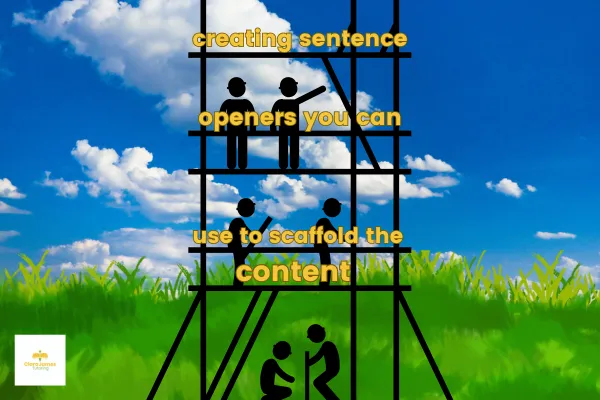EXPLORE, LEARN, EXCEL with
The Clara James Approach
BLOG PAGE
EDUCATION

Revise sentence openers to scaffold your answer
The other day, I was asked about the best way to help extend a child’s vocabulary in preparation for their English exams.
The obvious advice is to read. Read, read, and read some more. But not every teenager is going to be enthusiastic about picking up a book, especially when exams are looming, revision is piling up, and there are friends to socialise with.
So, what I would suggest is:
For analytical writing use Scaffolding Frames
Having a few strong sentence openers for each question can be helpful. These can help guide the paragraphs and keep the writing focused. For example:
"The use of the simile (insert quote) suggests that..."
"The author is creating an image of … through the use of the … The connotations of this word are..."
"Using personification to describe the … as a … gives the impression that..."
Going in with the generic phrases then act as a foundation that any analysis can be built around.
Focus on Key Words
Most of the marks in English are awarded for the analysis, so instead of worrying about a large vocabulary, concentrate on picking one or two key words from the quote. For example:
"A great evil god" Talk about the oxymoron, then analyse the words ‘evil’ and ‘god.’ What do they imply? How do they contrast?
"His lower legs were pistons" Explore how pistons are mechanical, suggesting the creature is like a machine. This could lead to the idea of invincibility or lack of vulnerability.
By digging into the connotations of these words, they can create a really good analysis without needing an extensive vocabulary.
I phrase I used to hear used regularly was “this makes the reader want to read on”. Instead of phrasing it like that talk about the connotations of the words and maybe end the sentence with something along the lines of “this intrigues the reader to delve further into the extract” or “this creates an element of (intrigue, curiosity, etc) and encourages them to discover more. It says the same thing but using slightly different vocabulary.
For Creative Writing
Creative writing can be terrifying for some people, writing beyond a simple sentence doesn’t come naturally then it is finished within a few lines with nothing more that can be said.
What I would suggest is that they need to memorise a list of synonyms for common words. For example:
Instead of “big,” they could use vast, colossal, or towering.
Instead of “scared,” they could use terrified, petrified, or anxious.
Use Sensory Details
Describing sights, sounds, smells, tastes, and textures makes writing seem more alive. For example:
Instead of saying, “The forest was dark,” they could write, “The dense forest cloaked the ground in shadows, the air thick with the earthy scent of damp moss.”
(What you can do is write the initial sentence, “the forest was dark” if necessary, then go back into it and think about the words you could use to describe the forest. Then insert the extra adjectives such as dense. Ask yourself how it might smell, what you might see, etc).
There’s a suggestion that when we are writing we should show, don’t tell
Rather than stating emotions or events, we should describe them. Instead of “He was angry,” use “His fists clenched, and his jaw tightened as his eyes blazed with fury.”
Look for inspiration from visual prompts
As revision look at pictures (e.g., a busy marketplace, or a stormy sea for example) and write descriptive sentences.
I hope this makes sense. Good luck if you have mocks in the next week or two. Fingers crossed they go well. Shout if you need any more help when you are revising.

I have created some sentences openers for AQA English Language Paper 1: Question 2 that you might find helpful. You can download them here: Free Download: Sentence openers for GCSE English Language Paper 1
Stay Connected with Our Latest Stories and Updates!
Explore our blog for insightful articles, tips, and news to inspire and inform.
Whether you're seeking practical advice or simply a good read, our blog has something for everyone. Don't miss out on our fresh contents!
© Copyright 2022 The Clara James Approach

